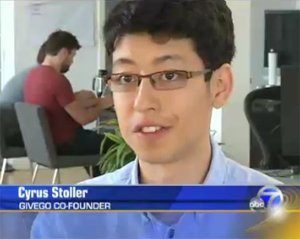Cyrus Stoller '10 Wins National Hack-a-Thon with GiveGo App

How long does it take to develop a business model? Computer programmer Cyrus Stoller '10 and partner Max Schultz drafted their fitness-meets-fundraising project in a 24-hour coding craze in Silicon Valley this July, securing victory at a regional hack-a-thon and support for a company soon to make its debut -- only a few months later.
Stoller and Schultz conceptualized GiveGo, a mobile phone application that allows users to raise money for charities while exercising, roughly a month before last month's national AngelHack coding competition. After winning the Silicon Valley qualifiers, their model went up against winning projects from regional hack-a-thons in Boston, New York, and Seattle. Beating over 250 other projects, GiveGo secured first place and an optional $25,000 seed fund for its continued development. It has been featured on the ABC News affiliate in the San Francisco Bay Area, Business Insider, and TechCrunch, a popular technology blog.
AngelHack is unique from other hack-a-thons in its scope and sponsors. While most hack-a-thons are sponsored by a single company and held at its headquarters, AngelHack's corporate lineup included Facebook, Google, Samsung, and Microsoft, and kicked off in four different U.S. cities before the finals.
Stoller, who thought AngelHack would be "a fun thing to do," didn't enter the competition with any expectations. "It's totally crazy that we won," he says. "We're over the moon."
Stoller and Schultz got inspiration for GiveGo from charity runs, which raised $1.5 billion for nonprofits last year. "There are definitely advantages to having big events to raise money - they're a good way to bring everyone together, but most of them happen only one day a year," Stoller says. "We believe that should be happening that day and every other day of the year."
"Swarthmore's definitely played a huge role in the process," he adds. "The whole culture of activism at Swarthmore definitely got me interested in using technology to promote social good, and GiveGo is a great way to do that."
GiveGo users invite friends and family to pledge money to their favorite charities through Facebook. The mobile application tracks and records every mile of walking, running, or biking completed, allowing sponsors to pledge donations per mile and cap their monthly contributions. At the end of each month, stories will appear on users' Facebook profiles detailing the amount they raised for charity and thanking sponsors for their support. So far, nonprofits from food banks to environmental organizations have hopped on board, hoping to generate donations and publicity through the new application.
With much of the programming work completed, Stoller and Schultz are continuing to forge partnerships with charities, nonprofits, and businesses before launching their application. When it comes to making pitches and promoting GiveGo, Stoller draws from his time with War News Radio and the Peaslee Debate Team on campus to drum up support for his project.
"Working at War News Radio was really helpful in learning how the press works and how to tell a story most effectively," Stoller says. "I learned that there's a lot of different ways to tell the exact same story, but that some are going to stick more than others."
Ultimately, Stoller sees GiveGo as a storytelling project as well. "Hopefully, one of the powers of GiveGo is that it's not just about collecting donations, it's about sharing a story," he says. "It's telling the story about why I feel passionately or my friend feels passionately about a cause. It's about sharing that emotional connection with the person or organization you're supporting. For example, if I get a request from a friend saying, 'Hey, my mom just got diagnosed with MS, and I'm trying to raise money,' that's a totally different story than receiving a generic MS letter in the mail."
Cyrus Stoller '10 graduated from Swarthmore with a double major in mathematics and computer science.


